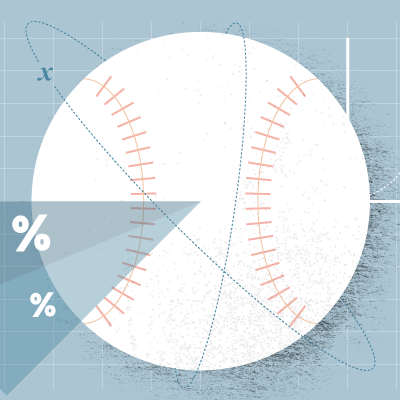Share this infographic on your site!
Embed this infographic on your site!
The editors at Sports Management Degrees decided to research the topic of:
Predicting Baseball: Demystifying Bayes' Theorem
The power of probability
- Nate Silver, the "king of quants",
- "Quants" is nerd talk for quantitative analysts
- 2003 - Released PECOTA the most accurate baseball player performance forecasting system in the world (still to this day.)
- Correctly predicted:
- 2008 - Presidential election: the winner in 49 of the 50 states
- 2008 - Senate: the winners of all 35 U.S. Senate races
- 2012 - Presidential election: the winner of all 50 states
- 2012 - Senate: the winners in 31 of 33 U.S. Senate races
- 2012 and 2013 Champion teams of NCAA Men's Basketball Tournament
Top Secret Classified
- While the math behind Nate Silver's predictive system is unknown to the public, it is understood to be based on Bayes.
- It is Bayes-based.
- "In the past ten years, it's hard to find anything that doesn't advocate a Bayesian approach." -Nate Silver
- Why?
- "Aggregate or group forecasts are more accurate than individual ones." -Nate Silver
What is Bayes' Theorem?
- A probability theory to measure the degree of belief that something will happen
- using conditional probabilities:
- probability event A occurs, given event B occurred
- Bayes theorem was first published in 1763, 2 years after Thomas Bayes' death
- Bayesian inference - Hindsight is 20-20:
- Define the variables based on actual historic data
- apply historic probabilities to similar future events
- Degrees of belief will change as more evidence is considered
How to Play Ball! The Bayesian Way
- Will the yankees win their next game?
- Hypothetically, Let's say that The Yankees are having a great season.
- Step 1: Start with the known results that you are trying to predict
- Event A (%W and %L)
- So far out of 100 games played
- 72 have been wins (W 72%) [point and insert into theorem]
- P(A.1) = 72/100 = .72 <--(W 72%)
- 28 have been losses [point and insert into theorem]
- P(A.2) = 28/100 = .28 <--(L 28%)
- Event B (Condition)
- When Sports analyst Bob predicts a Win!
- He is correct and Yankees win 55% of the time
- Common mistake! This one stat does not mean the Yankees have a 55% probability of winning. Consider more evidence.
- P(B/A.1) = .55 [insert into theorem]
- (Bob predicts a win and yankees win 55% of the time)
- When Sports analyst Bob predicts a Win!
- He is incorrect and Yankees lose 45% of the time
- P(B/A.2) =.45 [insert into theorem]
- (Bob predicted a win and yankees lose 45% of the time)
Night Owls
- Lets say that the Yankees win 60% of night games
- Common mistake! This one stat does not mean the yankees have a 60% probability of winning. Consider more evidence.
- Start with the results trying to predict
- Event A (1 and 2) aka (%W and %L)
- Sports analyst Bob has predicted a Win
- 76% chance the Yankees will win
- P(A.1) = 76/100 = .76 ()
- 24% chance the Yankees will lose
- P(A.2) = 24/100 = .24
- Event B (1 and 2) [Condition]
- When Yankees play at night
- Yankees win 60% of the time
- P(B/A.1) = .60
- Yankees Lose 40% of the time
- P(B/A.2) =.40
- There is now an 83% chance the Yankees will win their 101st game
- Breakdown
- When Bob says 101st game will be a win, the probability is 76%
- Yankees typically win more night games than not: 60% of them
- If Bob claims a win 72%-->76%
- It's a night game 76% -->83%
More game changing conditions to consider
- line up
- DH
- Left handed pitcher
- Midgame injuries
- turf
- wall height
- humidity
- crowd size
- home field Sources
- https://www.baseballprospectus.com/article.php?articleid=7652
- https://bayesball.blogspot.com/
- https://www.hardballtimes.com/main/article/bayes-theorem-and-prospect-valuation
- https://skepticalsports.com/?tag=bayes-theorem
- https://stattrek.com/probability/bayes-theorem.aspx

